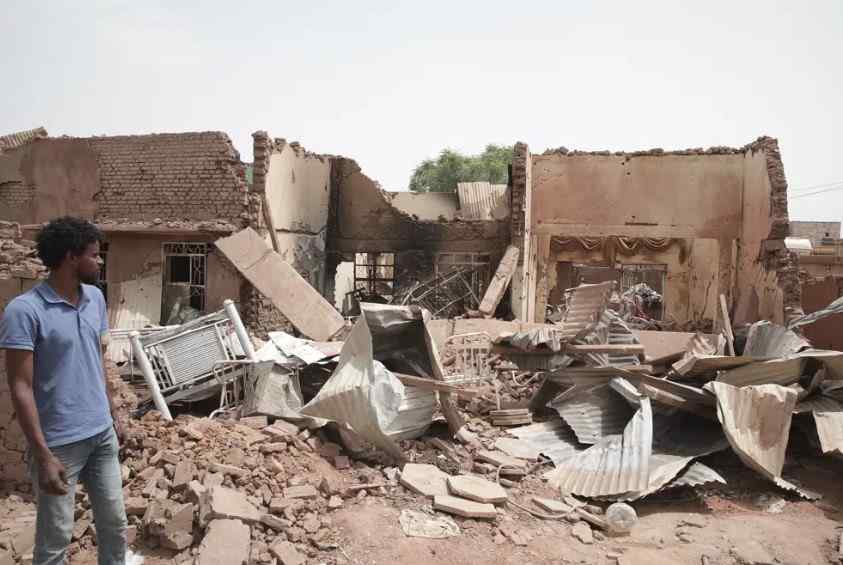Amid sporadic fighting around Khartoum, Sudan’s army has declared its intention to extend the three-day ceasefire that is set to expire this evening. On Wednesday night, the army released a statement indicating that General Abdel Fattah al-Burhan, the army’s leader, had granted preliminary approval for a proposal that would see the truce extended for an additional 72 hours, and an army representative sent to the South Sudan capital, Juba, for discussions.
The Sudanese armed forces and its rival, the paramilitary Rapid Support Forces (RSF), previously agreed to a three-day ceasefire that is due to expire late on Thursday. There was no immediate response from the RSF to the proposal from the Intergovernmental Authority on Development (IGAD), a regional bloc.
The military said the presidents of South Sudan, Kenya, and Djibouti have worked on a proposal that includes extending the truce and talks between the two forces. “Burhan thanked the IGAD and expressed an initial approval to that,” the army statement said.
Any ceasefire extension could help international evacuation efforts. UK military chiefs said evacuation flights would continue as long as conditions were safe, though the foreign secretary, James Cleverly, said the UK “cannot guarantee” how many further evacuation flights will depart once the ceasefire ends.
US secretary of state Antony Blinken and African Union Commission chairperson Moussa Faki Mahamat discussed working together to create a sustainable end to the fighting, the state department said in a statement on Wednesday.
Some of Wednesday’s heaviest battles were in Omdurman, a city adjoining Khartoum where the army was fighting RSF reinforcements from other regions of Sudan, a Reuters reporter said. Heavy gunfire and airstrikes could be heard into the evening.
In Khartoum, which together with two bordering cities is one of Africa’s largest urban areas, there was widespread looting. Since fighting erupted on 15 April, airstrikes and artillery have killed at least 512 people, wounded nearly 4,200, destroyed hospitals, and limited food distribution in the vast nation where a third of the 46 million population was already reliant on humanitarian aid.
The World Health Organization said only 16% of health facilities were functioning in Khartoum and predicted “many more deaths” due to disease and shortages of food, water, and medical services including immunization.
An estimated 50,000 acutely malnourished children have had treatment disrupted due to the conflict, and those hospitals still functioning are facing shortages of medical supplies, power, and water, according to a UN update on Wednesday.
Deadly clashes broke out in Geneina in West Darfur on Tuesday and Wednesday, resulting in looting and civilian deaths and raising concerns about an escalation of ethnic tensions, the update said. The crisis has sent growing numbers of refugees across Sudan’s borders, with the UN refugee agency estimating 270,000 people could flee into South Sudan and Chad alone.
Foreigners evacuated from Khartoum have described bodies littering streets, buildings on fire, residential areas turned into battlefields, and youths roaming with large knives. “It was horrible,” said Thanassis Pagoulatos, the 80-year-old Greek owner of the Acropole hotel in Khartoum, after arriving in Athens to be greeted by relatives.
“It has been more than 10 days without any electricity, without water, and five days nearly without food,” he added, describing shooting and bombing. “Really, the people are suffering, the Sudanese people.”
Beyond the humanitarian crisis, civilian groups fear the violence will enable the military to tighten its grip and revive the sway of an ousted autocrat’s loyalists. The Sudanese military has been in control since Bashir’s ousting, but protesters have continued to demand civilian rule. However, the latest outbreak of violence has raised concerns that the military will use the conflict as an excuse to consolidate its power.
The African Union and the United Nations have both condemned the violence and called for an immediate ceasefire. UN Secretary-General Antonio Guterres called for an “immediate cessation of hostilities and a return to negotiations.” The African Union has also urged the parties to “embrace dialogue” and resolve their differences peacefully.
The crisis has also drawn attention from the international community, with the United States and the United Kingdom calling for an end to the violence and the restoration of democracy. The UK has pledged to provide humanitarian aid to those affected by the conflict and has sent military planes to evacuate its citizens and other foreign nationals from the country.
In a statement on Wednesday, US Secretary of State Antony Blinken said that the US was “gravely concerned” by the violence and urged all parties to “cease hostilities immediately.” He also called for an “inclusive and transparent process” to resolve the crisis and restore democracy.
Meanwhile, the people of Sudan continue to suffer as the conflict rages on. With hospitals destroyed and food supplies limited, the humanitarian crisis is only expected to worsen in the coming days and weeks.

Image Credit: Marwan Ali/AP




